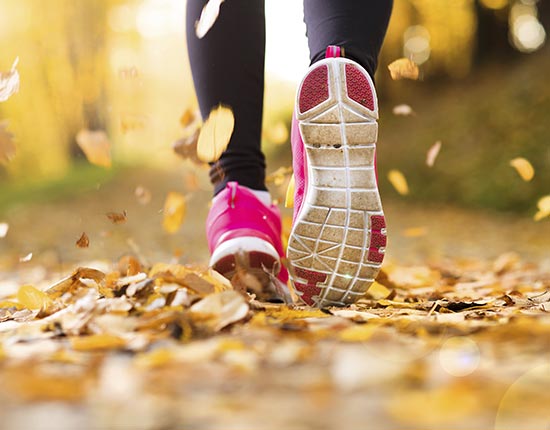Seasonal Shifts: How to Prepare Your Body for Fall

As the colorful leaves of autumn start to appear and the rituals of a new school year get underway, you may notice more than a change in the weather. It is not uncommon for your body to experience changes with the seasons: Aches, pains, trouble sleeping, allergies and other issues can surface. What most people don't know is that seasonal responses like this can easily be managed with traditional Eastern remedies.
To help ease your body into fall, try these helpful tips:
Kitchen Prevention. It's important to strengthen your immune system as the seasons change, especially with cold and flu season right around the corner. The Chinese rely on a customizable herbal paste made from a formula of some 30-40 herbs called Gao Fang, used to ward off infection. You can apply this traditional Chinese medicine (TCM) principle, and give your immune system a boost, simply by adding the common herb Astragalus Root (Huang Qi) to chicken soup and other hot dishes. It has a subtle, earthy flavor and scent, which will likely go unnoticed by the picky eaters in your family.
Have a Healing Drink. If the shifting seasons have already landed you a cold, make a soothing pot of ginger cinnamon tea. Known to have genuine healing powers, cinnamon helps relieve headaches and can stabilize blood sugar, while ginger soothes upset stomachs and has anti-inflammatory properties.
Rather than buying a box of teabags, you can make a much more effective brew at home by putting together a few common ingredients. Simply put 3-4 quarter-sized slices of ginger into a teapot of boiling water. Add a cinnamon stick, lemon and some brown sugar to taste, let it steep for about five minutes, and strain into a cup. Enjoy two cups a day, and your symptoms should begin to ease within a matter of days.
Rest Up. Many people experience sleep difficulties during seasonal changes, and getting enough sleep is especially crucial at this time. If you struggle with catching enough z's, acupuncture can help. The Journal of Neuropsychiatry and Psychiatry and Neurosciences have reported that acupuncture is a simple, safe and effective treatment for insomnia and anxiety (one of the causes of insomnia). It stimulates the production and release of brain chemicals, such as serotonin, that are vital to sleep and stress reduction. The result is a natural path to longer, more restorative sleep.
Slow Down. Ditch your high-impact fitness routine at least once or twice a week and replace it with the ancient Chinese art of tai chi. This exercise encourages gentle, flowing circular movements, balance and weight shifting, as well as breathing techniques. In 2011, scientists at Harvard University reported that tai chi has an extraordinary array of health benefits, and can help with arthritis, low bone density, breast cancer, heart disease, hypertension, anxiety, and even Parkinson's disease. It's definitely something you want in your arsenal when the seasons start to throw off your body's healthy balance.
Fight the Flu. While flu season officially starts in winter, it can strike in fall, and this is the time to be proactive. As a general rule, it's best not to wait until you get sick to take care of yourself, and this certainly holds true with flu. If you want a safe, natural yet effective approach, look to a different version of the flu shot: Acupuncture.
Inflammation plays a big role in the discomforts of flu, and acupuncture treatments can be a powerful tool for reducing inflammation and strengthening your immune system so you can beat the virus. Five to 10 sessions should do the trick, and make a noticeable impact on your health for over a month. If you're bothered by needles, try Shoni Shin or cold laser therapy - two painless, non-invasive forms of acupuncture that will relax even the most nervous patients!
Beat the Blues. If the shifting seasons have you feeling down, don't suffer in silence. Seasonal depression is not uncommon, and as we gear up for the holiday season, anxiety levels also tend to spike. Talk to a certified herbalist for help in the form of traditional Chinese herbal formulas, which have been used for centuries to combat anxiety, stress and depression. Some of the herbs in the most common formulas for depression are milkwort root, the root of bellflower (codonopsis pilosula), Japanese sweet flag, bupleurum or thorowax root, ziziphus or Chinese dates, bitter orange, Chinese cedar seeds, lophatherum (a type of bamboo) and turmeric. A good herbal practitioner will create a special formula or combination of formulas for each patient's individual needs.